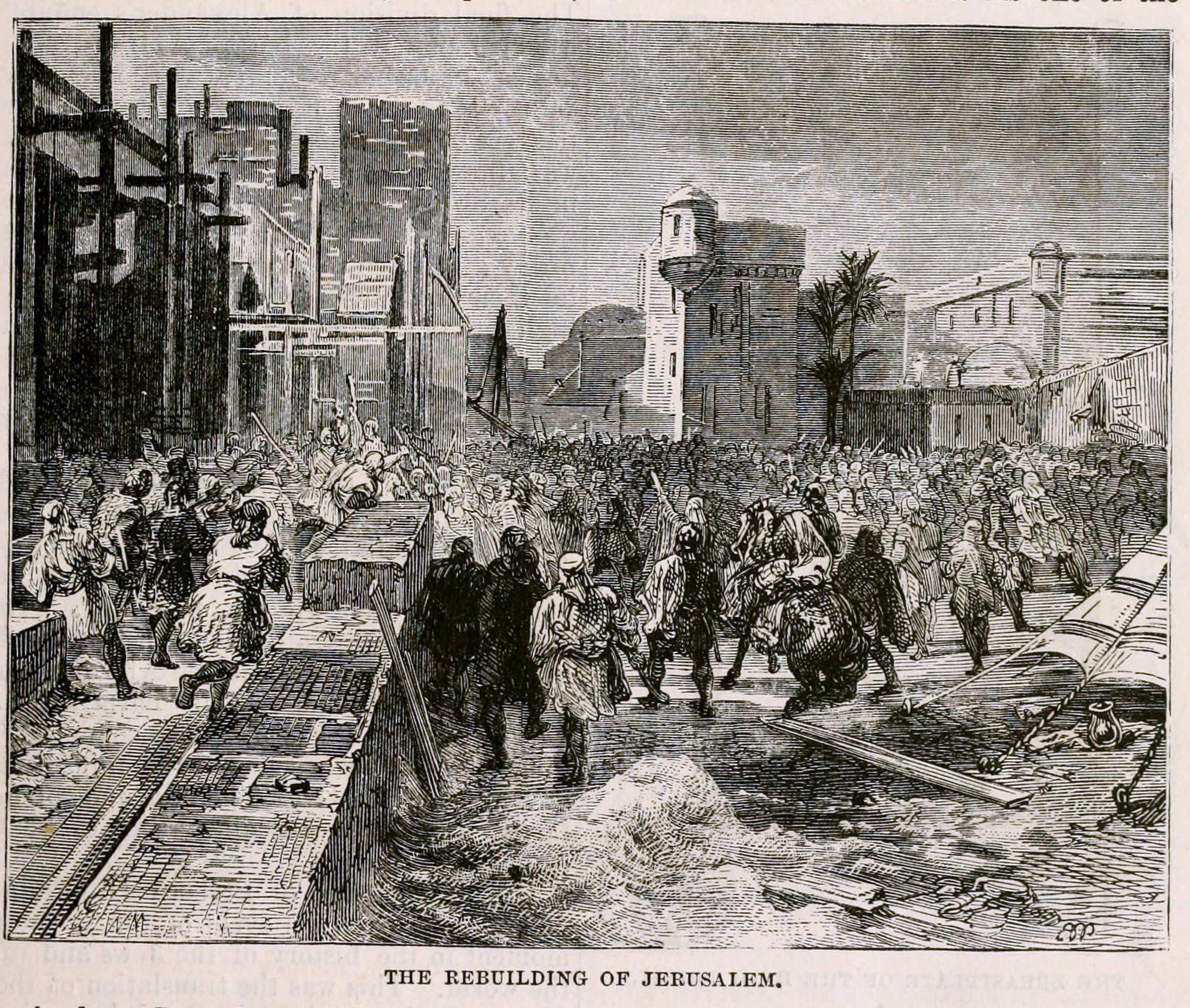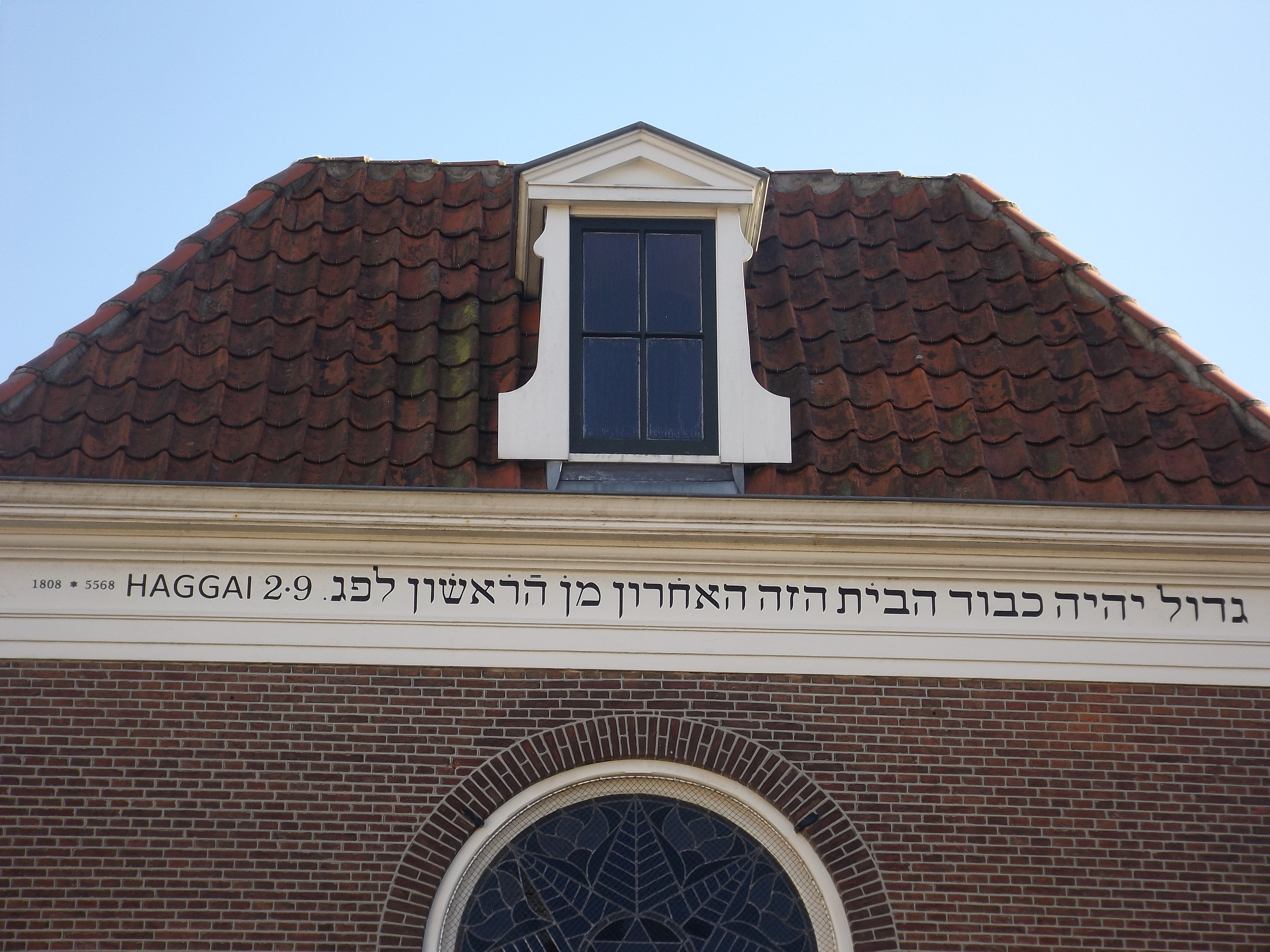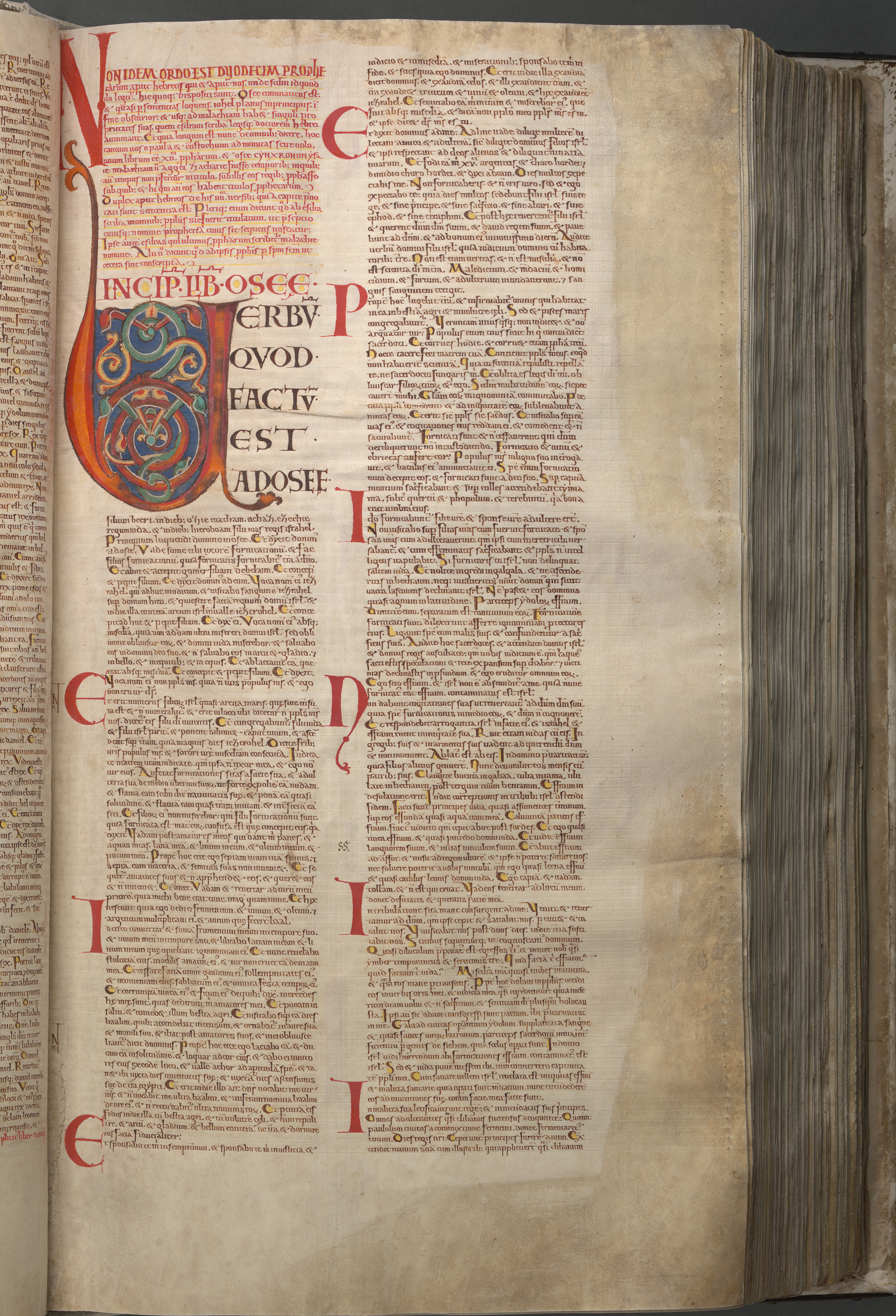|
Book Of Malachi
The Book of Malachi (Hebrew: , ') is the last book of the Neviim contained in the Tanakh, canonically the last of the Twelve Minor Prophets. In the Christian ordering, the grouping of the prophetic books is the last section of the Old Testament, making Malachi the last book before the New Testament. The book is commonly attributed to a prophet named Malachi, as its title has frequently been understood as a proper name, although its Hebrew meaning is simply "My Messenger" (the Septuagint reads "his messenger") and may not be the author's name at all. The name occurs in the superscription at 1:1 and in 3:1, although it is highly unlikely that the word refers to the same character in both of these references. Thus, there is substantial debate regarding the identity of the book's author. One of the Targums identifies Ezra (or Esdras) as the author of Malachi. Priest and Historian Jerome suggests that this may be because Ezra is seen as an intermediary between the prophets and the " ... [...More Info...] [...Related Items...] OR: [Wikipedia] [Google] [Baidu] |
Hebrew Language
Hebrew (; ; ) is a Northwest Semitic language of the Afroasiatic language family. Historically, it is one of the spoken languages of the Israelites and their longest-surviving descendants, the Jews and Samaritans. It was largely preserved throughout history as the main liturgical language of Judaism (since the Second Temple period) and Samaritanism. Hebrew is the only Canaanite language still spoken today, and serves as the only truly successful example of a dead language that has been revived. It is also one of only two Northwest Semitic languages still in use, with the other being Aramaic. The earliest examples of written Paleo-Hebrew date back to the 10th century BCE. Nearly all of the Hebrew Bible is written in Biblical Hebrew, with much of its present form in the dialect that scholars believe flourished around the 6th century BCE, during the time of the Babylonian captivity. For this reason, Hebrew has been referred to by Jews as '' Lashon Hakodesh'' (, ) since a ... [...More Info...] [...Related Items...] OR: [Wikipedia] [Google] [Baidu] |
Proper Noun
A proper noun is a noun that identifies a single entity and is used to refer to that entity (''Africa'', ''Jupiter'', '' Sarah'', ''Microsoft)'' as distinguished from a common noun, which is a noun that refers to a class of entities (''continent, planet, person, corporation'') and may be used when referring to instances of a specific class (a ''continent'', another ''planet'', these ''persons'', our ''corporation''). Some proper nouns occur in plural form (optionally or exclusively), and then they refer to ''groups'' of entities considered as unique (the ''Hendersons'', the '' Everglades'', ''the Azores'', the ''Pleiades''). Proper nouns can also occur in secondary applications, for example modifying nouns (the ''Mozart'' experience; his ''Azores'' adventure), or in the role of common nouns (he's no ''Pavarotti''; a few would-be ''Napoleons''). The detailed definition of the term is problematic and, to an extent, governed by convention. A distinction is normally made in current li ... [...More Info...] [...Related Items...] OR: [Wikipedia] [Google] [Baidu] |
Jerusalem
Jerusalem (; he, יְרוּשָׁלַיִם ; ar, القُدس ) (combining the Biblical and common usage Arabic names); grc, Ἱερουσαλήμ/Ἰεροσόλυμα, Hierousalḗm/Hierosóluma; hy, Երուսաղեմ, Erusałēm. is a city in Western Asia. Situated on a plateau in the Judaean Mountains between the Mediterranean Sea, Mediterranean and the Dead Sea, it is one of the List of oldest continuously inhabited cities, oldest cities in the world and is considered to be a holy city for the three major Abrahamic religions: Judaism, Christianity, and Islam. Both Israelis and Palestinians claim Jerusalem as their Capital city, capital, as Israel maintains its primary governmental institutions there and the State of Palestine ultimately foresees it as its seat of power. Because of this dispute, Status of Jerusalem, neither claim is widely recognized internationally. Throughout History of Jerusalem, its long history, Jerusalem has been destroyed at least twice, Sie ... [...More Info...] [...Related Items...] OR: [Wikipedia] [Google] [Baidu] |
Nehemiah
Nehemiah is the central figure of the Book of Nehemiah, which describes his work in rebuilding Jerusalem during the Second Temple period. He was governor of Persian Judea under Artaxerxes I of Persia (465–424 BC). The name is pronounced or in English. It is in Hebrew , ''Nəḥemyāh'', "Yah comforts". Most scholars believe Nehemiah was a real historical figure and that the Nehemiah Memoir, a name given by scholars to certain portions of the book written in the first person, is historically reliable.For confirmation that many scholars share this view, see For confirmation that most scholars share this view, see For an author who disagrees with the scholarly majority position on the historicity of Nehemiah and Ezra, but acknowledges the existence of that majority, see Book of Nehemiah narrative In the 20th year of Artaxerxes I (445 or 444 BC), Nehemiah was cup-bearer to the king. Learning that the remnant of Jews in Judah were in distress and that the walls of Jerusale ... [...More Info...] [...Related Items...] OR: [Wikipedia] [Google] [Baidu] |
Book Of Haggai
The Book of Haggai (; he, ספר חגי, Sefer Ḥaggay) is a book of the Hebrew Bible or Tanakh, and is the third-to-last of the Twelve Minor Prophets. It is a short book, consisting of only two chapters. The historical setting dates around 520 BC before the Temple had been rebuilt. The original text was written in Biblical Hebrew. Authorship The Book of Haggai is named after the prophet Haggai whose prophecies are recorded in the book. The authorship of the book is uncertain. Some presume that Haggai wrote the book himself but he is repeatedly referred to in the third person which makes it unlikely that he wrote the text: it is more probable that the book was written by a disciple of Haggai who sought to preserve the content of Haggai's spoken prophecies. There is no biographical information given about the prophet in the Book of Haggai. Haggai's name is derived from the Hebrew verbal root ''hgg'', which means "to make a pilgrimage." W. Sibley Towner suggests that ... [...More Info...] [...Related Items...] OR: [Wikipedia] [Google] [Baidu] |
Sirach
The Book of Sirach () or Ecclesiasticus (; abbreviated Ecclus.) is a Jewish work, originally in Hebrew, of ethical teachings, from approximately 200 to 175 BC, written by the Judahite scribe Ben Sira of Jerusalem, on the inspiration of his father Joshua son of Sirach, sometimes called Jesus son of Sirach or Yeshua ben Eliezer ben Sira. In Egypt, it was translated into Greek by the author's unnamed grandson, who added a prologue. This prologue is generally considered the earliest witness to a canon of the books of the prophets, and thus the date of the text is the subject of intense scrutiny. The book itself is the largest wisdom book from antiquity to have survived. Canonical status Sirach is accepted as part of the canon by Catholics, Eastern Orthodox, and most Oriental Orthodox Christians. The Anglican tradition considers Sirach (which was published with other Greek Jewish books in a separate section of the King James Bible) among the apocryphal books, and read them ... [...More Info...] [...Related Items...] OR: [Wikipedia] [Google] [Baidu] |
Kingdom Of Judah
The Kingdom of Judah ( he, , ''Yəhūdā''; akk, 𒅀𒌑𒁕𒀀𒀀 ''Ya'údâ'' 'ia-ú-da-a-a'' arc, 𐤁𐤉𐤕𐤃𐤅𐤃 ''Bēyt Dāwīḏ'', " House of David") was an Israelite kingdom of the Southern Levant during the Iron Age. Centered in Judea, the kingdom's capital was Jerusalem. The other Israelite polity, the Kingdom of Israel, lay to the north. Jews are named after Judah and are primarily descended from it. The Hebrew Bible depicts the Kingdom of Judah as a successor to the United Kingdom of Israel, a term denoting the united monarchy under biblical kings Saul, David and Solomon and covering the territory of Judah and Israel. However, during the 1980s, some biblical scholars began to argue that the archaeological evidence for an extensive kingdom before the late-8th century BCE is too weak, and that the methodology used to obtain the evidence is flawed. In the 10th and early 9th centuries BCE, the territory of Judah appears to have been sparsely populate ... [...More Info...] [...Related Items...] OR: [Wikipedia] [Google] [Baidu] |
Origen Of Alexandria
Origen of Alexandria, ''Ōrigénēs''; Origen's Greek name ''Ōrigénēs'' () probably means "child of Horus" (from , "Horus", and , "born"). ( 185 – 253), also known as Origen Adamantius, was an early Christian scholar, ascetic, and theologian who was born and spent the first half of his career in Alexandria. He was a prolific writer who wrote roughly 2,000 treatises in multiple branches of theology, including textual criticism, biblical exegesis and hermeneutics, homiletics, and spirituality. He was one of the most influential and controversial figures in early Christian theology, apologetics, and asceticism. He has been described as "the greatest genius the early church ever produced". Origen sought martyrdom with his father at a young age but was prevented from turning himself in to the authorities by his mother. When he was eighteen years old, Origen became a catechist at the Catechetical School of Alexandria. He devoted himself to his studies and adopted an asceti ... [...More Info...] [...Related Items...] OR: [Wikipedia] [Google] [Baidu] |
Church Fathers
The Church Fathers, Early Church Fathers, Christian Fathers, or Fathers of the Church were ancient and influential Christian theologians and writers who established the intellectual and doctrinal foundations of Christianity. The historical period in which they worked became known as the Patristic Era and spans approximately from the late 1st to mid-8th centuries, flourishing in particular during the 4th and 5th centuries, when Christianity was in the process of establishing itself as the state church of the Roman Empire. In traditional dogmatic theology, authors considered Church Fathers are treated as authoritative, and a somewhat restrictive definition is used. The academic field of patristics, the study of the Church Fathers, has extended the scope of the term, and there is no definitive list. Some, such as Origen and Tertullian, made major contributions to the development of later Christian theology, but certain elements of their teaching were later condemned. Great Fat ... [...More Info...] [...Related Items...] OR: [Wikipedia] [Google] [Baidu] |
Abraham Kuenen
Abraham Kuenen (16 September 1828 – 10 December 1891) was a Dutch Protestant theologian. Kuenen was born in Haarlem, the son of an apothecary. On his father's death it became necessary for him to leave school and take a humble place in the business. By the generosity of friends he was educated at the gymnasium at Haarlem and afterwards at the University of Leiden. He studied theology, and won his doctor's degree by an edition of thirty-four chapters of Genesis from the Arabic version of the Samaritan Pentateuch. In 1853 he became professor extraordinarius of theology at Leiden, and in 1855 full professor. He married a daughter of Willem Muurling, one of the founders of the Groningen school, which made the first pronounced breach with Calvinistic theology in the Reformed Church of the Netherlands. Kuenen himself soon became one of the main supporters of the modern theology, of which Jan Hendrik Scholten and Karel Willem Opzoomer (b. 1821) were the chief founders, and of which ... [...More Info...] [...Related Items...] OR: [Wikipedia] [Google] [Baidu] |
Julius Wellhausen
Julius Wellhausen (17 May 1844 – 7 January 1918) was a German biblical scholar and orientalist. In the course of his career, he moved from Old Testament research through Islamic studies to New Testament scholarship. Wellhausen contributed to the composition history of the Pentateuch/Torah and studied the formative period of Islam. For the former, he is credited as one of the originators of the documentary hypothesis. Biography Wellhausen was born at Hamelin in the Kingdom of Hanover. The son of a Protestant pastor, he later studied theology at the University of Göttingen under Georg Heinrich August Ewald and became ''Privatdozent'' for Old Testament history there in 1870. In 1872, he was appointed professor ordinarius of theology at the University of Greifswald. However, he resigned from the faculty in 1882 for reasons of conscience, stating in his letter of resignation: He became professor extraordinarius of oriental languages in the faculty of philology at Halle, was el ... [...More Info...] [...Related Items...] OR: [Wikipedia] [Google] [Baidu] |
Book Of The Twelve
The Minor Prophets or Twelve Prophets ( he, שנים עשר, ''Shneim Asar''; arc, תרי עשר, ''Trei Asar'', "Twelve") ( grc, δωδεκαπρόφητον, "the Twelve Prophets"), occasionally Book of the Twelve, is a collection of prophetic books, written between about the 8th and 4th centuries BC, which are in both the Jewish Tanakh and Christian Old Testament. In the Tanakh, they appear as a single book, (''"The Twelve"''), which is the last book of the Nevi'im, the second of three major divisions of the Tanakh. In the Christian Old Testament, the collection appears as twelve individual books, one for each of the prophets: the Book of Hosea, Joel, Amos, Obadiah, Jonah, Micah, Nahum, Habakkuk, Zephaniah, Haggai, Zechariah, and Malachi. Their order, and position in the Old Testament, varies slightly between the Protestant, Catholic and Eastern Orthodox Bibles. The name "Minor Prophets" goes back apparently to St. Augustine, who distinguished the 12 shorter prophet ... [...More Info...] [...Related Items...] OR: [Wikipedia] [Google] [Baidu] |









